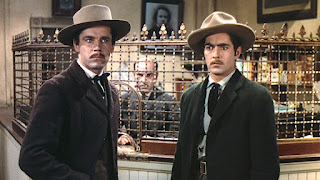After the end of the Civil War, the railroads expand west. In Missouri, unscrupulous agents intimidate farmers out of their land to clear the way for the train's arrival. Jesse James (Tyrone Power) and his brother Frank (Henry Fonda) support their mother (Jane Darwell) when she refuses to sell the family farm. In the ensuing fracas she is killed, Jesse exacts revenge, and the brothers go on the run.
As he evades the law Jesse maintains a romance with the love of his life Zerelda "Zee" Mimms (Nancy Kelly), the daughter of the Major (Henry Hull), a crusty Liberty City newspaper publisher. Will Wright (Randolph Scott) is the Marshal in town, and sympathetic to Jesse's anti-railroad cause. After Jesse and Frank commit a string of robberies targeting the rail companies, Will negotiates leniency if Jesse turns himself in. When the deal goes sour, the James brothers become notorious outlaws, attempting ever more dangerous heists and jeapardizing Jesse and Zee's dreams of domestic bliss.
While undoubtedly entertaining, the Nunnally Johnson script holds only the most tenuous connection with historical truth. For the most part Jesse James romantacizes a criminal and Confederate cause sympathizer into a folk hero fighting the good fight against evil corporate types. This is the Hollywood machine selling tickets by creating a mythology that caters to the American psyche, and doing so with brilliant craftsmanship.Setting aside truth and fiction, Jesse James is a technicolour joy. The pacing is brisk, director Henry King intermingling scenes of action (some featuring audacious stunts) with romance and character interactions, and pausing when necessary at some powerful milestones. The tense night with Jesse in captivity and Frank plotting a breakout from under the noses of rail company executives is a highlight, as is the final chapter, Jesse's two possible destinies engaged in a battle for his soul as traitors gather. Humour is sprinkled in careful doses to liven the mood.
King does trace Jesse's descent from laudable defender of personal family property to hardened gang leader, and on a couple of occasions the soul-destroying realities of his criminal pursuits are brought to the fore. Tyrone Power's natural charm ensures a generally jovial portrayal, but he also brings a soullessness to the darkest hours dominated by an insatiable thirst to pull off the next big robbery.
Making excellent use of stunts, King's directing is kinetic energy in motion. A tracking shot of Jesse in silhouette making his way back-to-front atop a moving train is breathtaking. A seemingly impossible jump off a cliff is both controversial and stunning. And several chases and narrow escapes are punctuated by character improvisation captured by multiple careful camera placements.
Henry Fonda as older brother Frank shines in a couple of scenes, lacking Jesse's charisma but making up for it with cool guile. In addition to a sage Randolph Scott, the supporting cast also includes John Carradine as a sweaty Bob Ford, Brian Donlevy as the oily land expropriator, and Ernest Whitman as loyal servant Pinky.
Jesse James detaches from facts, but still finds spectacular success.
All Ace Black Movie Blog reviews are here.




Very entertaining movie, politically/emotionally skewed to depression era sensibilities, only very tenuously connected to historical accuracy - and all the better for it. It's also worth mentioning that 30 years later a similarly entertaining movie, also politically/emotionally skewed to the sensibilities of its era came out; it even contains many parallel plot points and (to a lesser extent) character arcs. It was called Butch Cassidy and the Sundance Kid. In another parallel it too was only very tenuously connected to historical accuracy - and also all the better for it!
ReplyDeleteThanks for the comment - and interesting point about the contextual similarities with Butch Cassidy And The Sundance Kid.
Delete